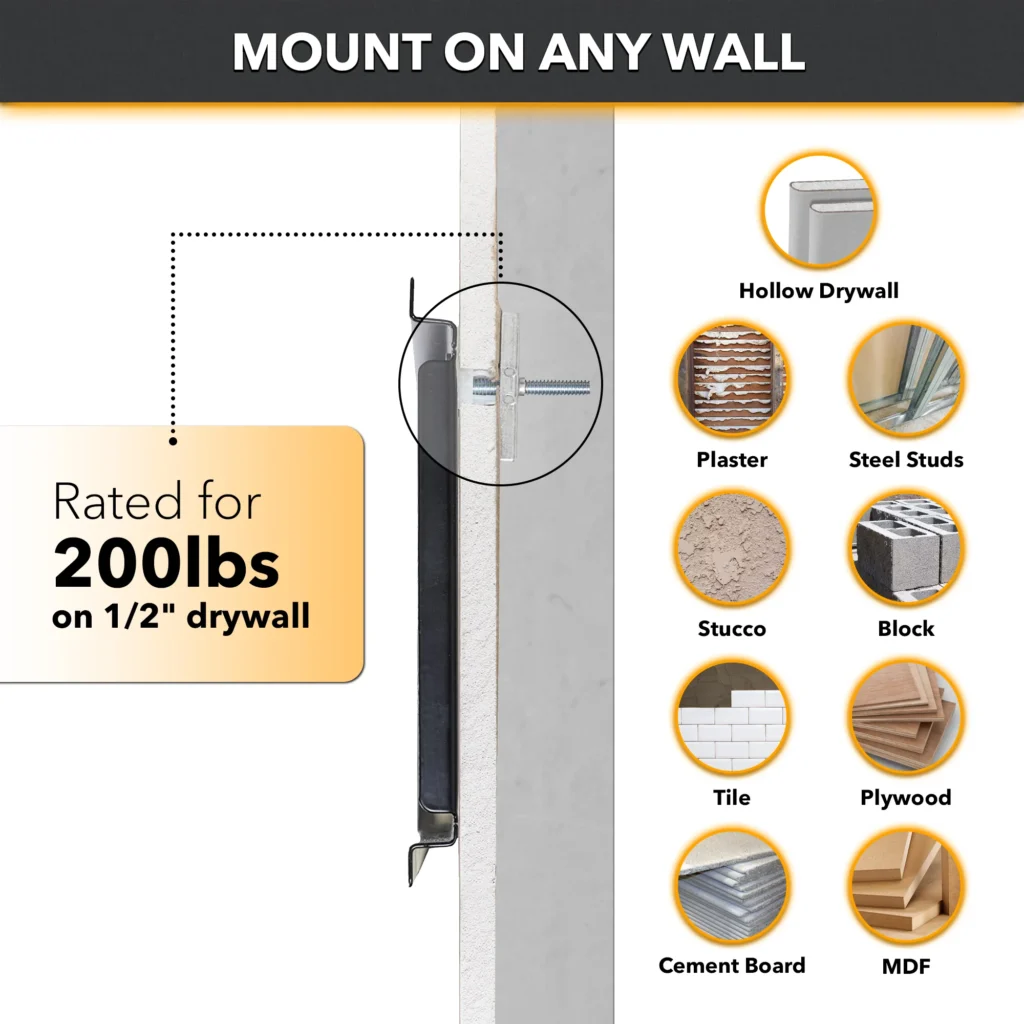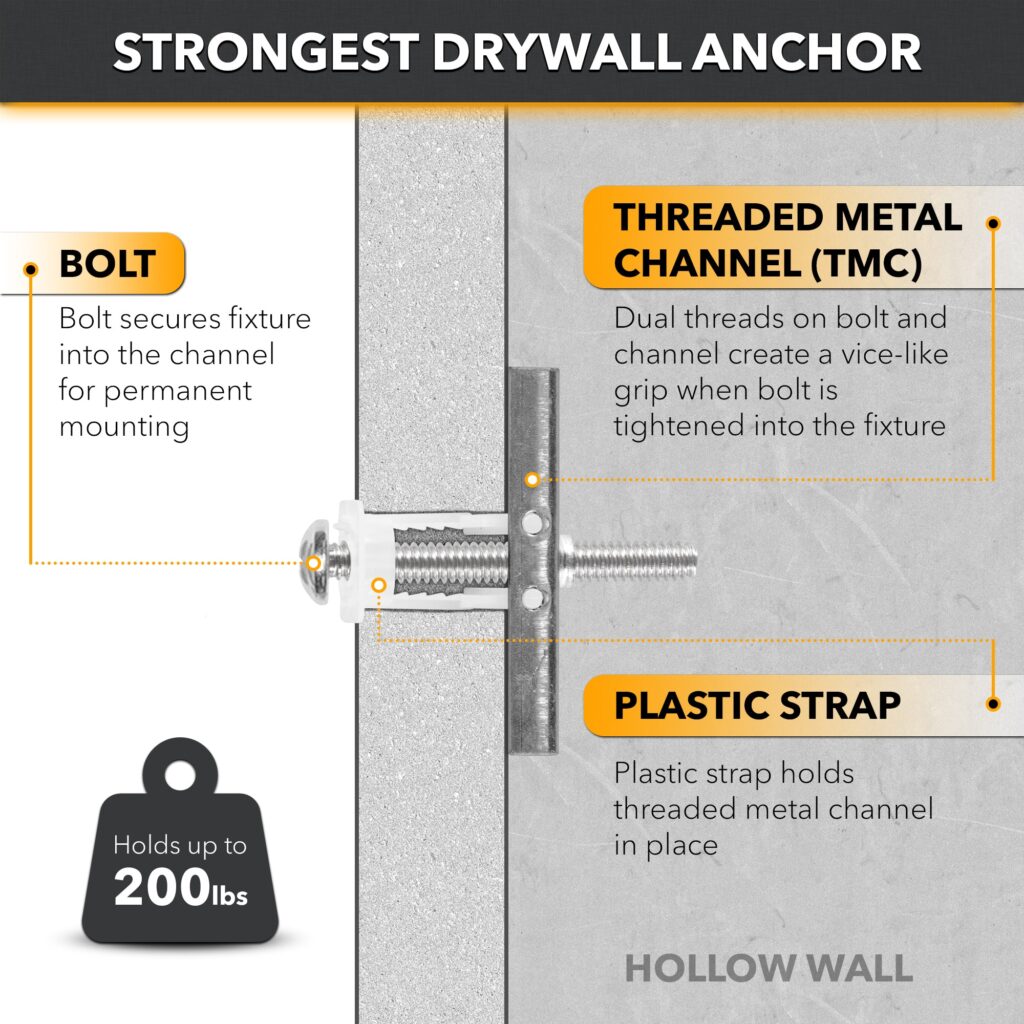How to Find the Right Wall Anchor for Your Project’s Weight Capacity?


In this post, we’ll break down the factors you need to consider and guide you through the process of selecting the perfect anchor.
When it comes to mounting or hanging heavy objects on your walls, the right wall anchor is crucial for ensuring both the safety of your home and the stability of your installation. Whether you’re mounting a TV, hanging shelves, or attaching a heavy mirror, using the right anchor for the job is essential to avoid accidents and damage to your walls. But with so many options available, how do you choose the right wall anchor for your project’s weight capacity?
Before diving into the specifics of finding the right anchor, it’s important to understand the role of a wall anchor. Wall anchors are used when you need to attach something to a surface that doesn’t have studs or solid structures to support the weight, such as drywall or plaster. The right anchor will hold your mounted items securely without damaging the wall.
Each anchor has a specific weight capacity, which indicates the maximum weight it can support without failing. This capacity depends on several factors, including the anchor’s material, design, and the type of wall it’s being used in. Choosing the wrong anchor can result in the anchor pulling out of the wall or even damaging the drywall, so matching the anchor’s weight capacity to your project’s needs is critical.

Type of Wall
The first step in selecting the right wall anchor is knowing what type of wall you’re working with. The weight capacity of your anchor will depend on whether you’re mounting on drywall, plaster, concrete, brick, or wood. Drywall is the most common surface for anchors, but different wall types require different anchors. For example, drywall anchors are designed to spread the load within the drywall itself, while masonry anchors are better suited for brick or concrete walls.
Weight of the Item Being Mounted
The weight of the item you’re mounting directly influences the type of anchor you’ll need. For lightweight objects, simple plastic or toggle anchors may suffice, but for heavier items like a large flat-screen TV, bookshelves, or mirrors, you’ll need more robust anchors with a higher weight capacity. For these heavy-duty applications, consider using anchors specifically designed to handle larger weights, such as metal anchors or specialty anchors like Elephant Anchors.
Size of the Anchor
In general, larger anchors provide a higher weight capacity. The size of the anchor also determines how much weight it can distribute across the surface of the wall. For example, a large, heavy-duty anchor will have a higher weight capacity than a small, lightweight plastic anchor. The key is to ensure the anchor is appropriately sized for both the weight of the object and the type of wall it will be installed into.

4. Anchor Material
Different materials offer different strength levels. Plastic anchors are ideal for lightweight applications, but for heavier loads, metal anchors or specialty anchors (such as Elephant Anchors) are your best bet. Metal anchors provide more stability and durability, which is especially important for mounting heavy objects like televisions or large shelves.
5. Anchor Design
The design of the anchor will also play a role in its weight capacity. For example, expanding anchors, like toggle bolts, spread the load over a larger area and are typically stronger than simple screw anchors. On the other hand, sleeve anchors offer a secure hold in masonry walls but may not be ideal for drywall.
Lightweight Projects (Up to 25 lbs)
For small, light items like picture frames or small shelves, a simple plastic anchor or a self-drilling anchor should suffice. These anchors are easy to install and typically support up to 25 lbs.
Medium Weight Projects (25 to 50 lbs)
For medium-weight items such as larger shelves or smaller TVs, a toggle bolt or a metal screw anchor will provide the support needed. These types of anchors spread the load more effectively and provide greater stability.
3. Heavyweight Projects (50 lbs and above)
For large TVs, cabinets, or anything over 50 lbs, you’ll need a heavy-duty anchor designed for higher weight capacities. Elephant Anchors are an excellent option for such projects, as they can support up to 200 lbs on metal studs and offer exceptional stability and strength.
Choosing the right wall anchor for your project is key to ensuring a safe and secure installation. By considering factors such as the type of wall, the weight of the object being mounted, and the design and material of the anchor, you can confidently choose the right anchor to support your project. If you’re working with heavy-duty items, such as a TV or large shelves, anchors like Elephant Anchors, which are designed to handle up to 200 lbs, will provide the necessary strength and reliability. Remember, matching the anchor’s weight capacity with your project’s needs is the best way to prevent accidents and ensure your installations last for years to come.
🔧🖥️ Tired of struggling to mount your TV on drywall? Meet our Elephant Anchors—the ultimate solution for secure and hassle-free mounting! Whether you're working with steel studs, no studs, or need heavy-duty support, our anchors have got you covered. Easy installation and rock-solid stability for up to 90lbs. Perfect for TVs, cabinets, shelves, and more. Upgrade your space today!
Accidentally drilled into a pipe behind the drywall? Don't panic! First, stop drilling and assess the situation. Shut off the main supply—water, gas, or electricity. For water pipes, use a temporary fix like a pipe repair clamp. For gas, evacuate and call emergency services. For electrical, turn off the power and contact an electrician. Then, seek professional repairs. Finally, patch the drywall to restore your wall. Follow these steps to handle the situation effectively and safely.
Mounting a TV on a metal stud wall can be tricky, but the Elephant Anchors 200lbs Metal Stud Mounting Kit makes it easy and secure. This all-in-one kit includes heavy-duty anchors, a razor-sharp drill bit, screws, and washers, providing everything you need for a stable installation. Designed specifically for metal studs, Elephant Anchors ensure your TV stays safely in place, even with larger models. With a 200lb weight capacity, this kit offers a simple, durable solution for mounting TVs with confidence. Say goodbye to installation worries and hello to a secure setup with Elephant Anchors!